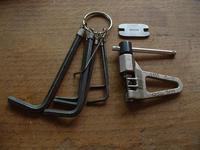
| [ Main index » Bicycle components tests » Bicycle multi tools | ] |
I think it was about two years ago from when I started this page in 2010 (so around 2007 or 2008) that I read a comment by someone on a website (forum of mtbr.com?) recommending to someone else who asked about multi tools/mini tools, to just use separate tools (mainly hex keys). At that time I had a look at the weights of various multitools on the web and measured the hex keys I had, and it was obvious that he was right regarding the hex keys.
When I created this page I expanded that investigation with trying to find loose tools to complete a low weight toolkit for repairs etc. to replace the cumbersome mini tools. I think the only advantage of mini-tools is that you have one thing and not multiple ones in your saddle bag, which also means less pointy bits sticking out (which can poke say through a tube of glue for tyre repairs) etc. But is that enough?
And actually, no it isn't! Now, 2016-5-12, I updated this page again with a good and possibly obvious storage option that I use for separate tools: A pencil case! Yes, a small leather or canvas/thick cloth one is perfect, nothing sharp gets through these, and that's needed. Separate tools are far superior to multi tools, and with the zipper you have quick access. I keep the tyre levers and patches etc. in there too. Perfect solution!
Weights of some separate tools:
Mass of this is: 72 + 76 + 9 + 17 g. = 174 g.
Compare now to mini tools such as the new Topeak Mini 20 Pro which weighs 150 g. It has extra compared to the above: 8 & 10 mm hex keys, Phillips & flat head screwdriver and a chain hook (handy to assemble/disassemble a chain).
Chain hook: Made one myself from stainless steel wire. Just 1 gram.
Standard flathead and phillips screwdrivers: ca. 45 g. each (with large handle)
As these are pretty heavy here's my next idea:
Perhaps we can get almost the same functionality with little weight, in this way: Take a Phillips-head screwdriver and modifiy it: remove the handle, bend the steel to give a tool similar to the hex keys, and file it down on the end where the handle was to give a flat head screwdriver at that end (disadvantage: This is not properly hardened, although it is possible to do that yourself too).
You can also get these ready made from a DIY store: combined S-shaped flat/philips head screwdriver:

(mass: 16 g.)
Perhaps it is even better to get separate flathead and philips screwdrivers, remove the handles from both, and bend both in a vice to give a tool similar to the hex keys for standard and philips screws each. Or use multiple sizes...
8 and 10 mm hex keys are very heavy and not often used, so get a converter? (but you can only get those in multitools it seems) Or just leave them out? A complete set of hex keys from 1.5 to 8 mm weighs about 132 g. which is a lot heavier than the set of just 1.5 to 6 mm.
At the moment my choice is to just leave them out.
It's easy to assemble a bike toolkit for repairs or adjustments to go into your backpack or saddle bag etc., which weighs ca. 191 gram and has proper tools for most tasks you may want to perform away from home. This is slightly more than a multitool, but significantly easier to use and the tools are of much better quality.
What needs to be done now is make/find a good and low weight storage 'thingy' for all those tools... (2016-5-12: See the start of the page.)
Minitools/multitools are essentially a waste of money because they do not give easily usable tools for roadside repairs, nor will you save much weight with them. I wouldn't trust them to be reliable either (I've destroyed one applying a force with a hex key that a normal hex key would not have a problem with; by destroyed I mean that the housing that keeps the hex keys and others together, was bent and damaged), whereas the standard loose tools are definitely reliable.
Note that this varies per bike, for example for stems you can need 4, 5, 6 mm depending on make/type, older Shimano derailleur hangers use 6 mm, newer ones 5 mm. It won't change which tools you need most though...
Inner hex keys:
Phillips-head screwdrivers:
Flat screwdrivers:
Wrenches (or socket wrenches) for hex bolts/nuts:
Torx:
So, what do you really need? Well, inner-hex 3-6 mm, flat screwdriver 4 mm & 8 mm (or replace both with a 6 mm screwdriver), torx t25 (only for disc brakes), wrench for 8 & 10 mm.
| To email me go to the email page |
Last modified: 2016-5-12